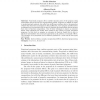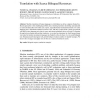470 search results - page 45 / 94 » Using Unknown Word Techniques to Learn Known Words |
TASLP
2010
13 years 2 months ago
2010
To solve the knowledge bottleneck problem, active learning has been widely used for its ability to automatically select the most informative unlabeled examples for human annotation...
IJCAI
2007
13 years 9 months ago
2007
Computing semantic relatedness of natural language texts requires access to vast amounts of common-sense and domain-specific world knowledge. We propose Explicit Semantic Analysi...
AAAI
1996
13 years 9 months ago
1996
of it suffer from a number of limitations, including: The effectiveness of an analogical reasoner depends upon its ability to select a relevant analogical source. In many problem d...
JUCS
2008
13 years 7 months ago
2008
: Functional programs often combine separate parts of the program using intermediate data structures for communicating results. Programs so defined are easier to understand and mai...
MT
2002
13 years 7 months ago
2002
Machine translation of human languages is a field almost as old as computers themselves. Recent approaches to this challenging problem aim at learning translation knowledge automat...


